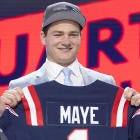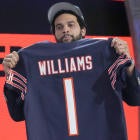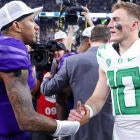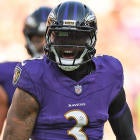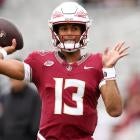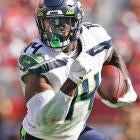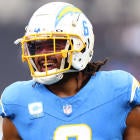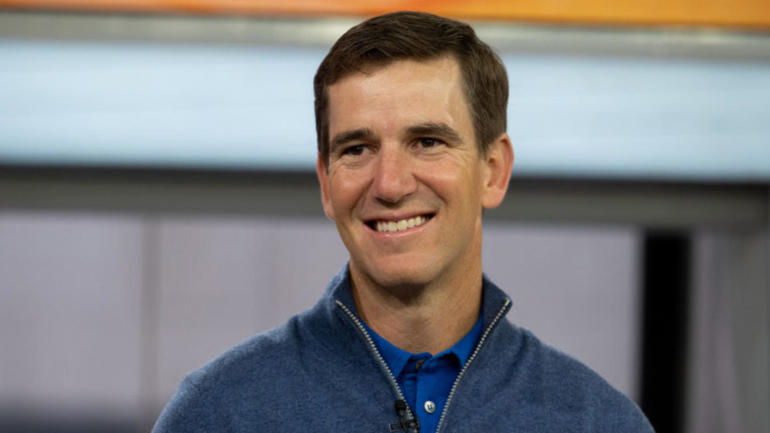
Aaron Rodgers' season-ending injury has re-opened the debate regarding turf surfaces and its place in the NFL. Eli Manning, the longtime Giants' quarterback who spent his entire career playing home games on turf, doesn't think that eliminating turf would be a good idea.
Manning made a convincing case for the NFL not to go to grass-only fields. The two-time Super Bowl MVP used last weekend's games at MetLife Stadium in his argument to keep turf surfaces. The Giants and Cowboys played in rainfall Sunday night before the Jets and Bills played on the same field 24 hours later.
"I think the turf, it gives you a reliable field all the time," Manning said on the "Front Office Sports Today" podcast. "The Giants played in that same stadium in a big rain storm. If you played that game and you had to play another game on Monday night on the same field, it would be ripped up and muddy and wet and all messed up anyways. So I think it eliminates that.
"You always have a clean surface. … The turf didn't have a factor in that injury."
Manning has a point. If MetLife used grass instead of turf, the Jets-Bills game would have literally been muddied down by a poor playing surface. That being said, the NFL probably wouldn't have scheduled games at MetLife on back-to-back days if the stadium used grass.
Acrisure Stadium, which has hosted the Steelers since 2001, has had numerous situations where the grass playing surface was compromised due to either the Pitt Panthers or a high school game being played on that field the previous one or two days. In 2007, following heavy rainfall, the Steelers and Dolphins were forced to play on a soupy field in a game that has been hailed as the "Mud Bowl." In a game the Steelers won 3-0, Dolphins running back Ricky Williams suffered a season-ending injury.
You’d think a game that ended 3-0 would be boring but the Steelers/Dolphins Mud Bowl in 2007 gave us the best punt in Monday Night Football history. pic.twitter.com/JMGpBQESK6
— Daniel Valente (@StatsGuyDaniel) April 18, 2020
MetLife Stadium did switch to a new synthetic turf following the NFLPA's letter last fall calling for an immediate ban of slit film turf. In his letter, NFLPA president JC Tretter noted that games played on slit film turf have higher in-game injury rates compared to other playing surfaces. Non-contact injuries and foot and ankle injuries are among the injuries that statistically occur more on slit film turf, according to Tretter.
The Bengals are one of the few NFL teams that still uses slit film turf. Katie Blackburn, the team's executive vice president, doesn't think that the turf has negatively impacted the Bengals.
"I feel like our surface has served us really well so far," Blackburn said in March at the owners meeting, via Yahoo Sports. "Some of our biggest injuries were on grass fields at other spots. So it's always hard. There's so many stats. But there's a regular replacement (schedule) for the field at the stadium, and we're sticking with that regular replacement at the moment because our field has served us well."
Joe Burrow, the Bengals' Pro Bowl quarterback who recently signed a record-setting extension with the team, offered a different answer when asked about the grass-turf debate earlier this week.
"In the last couple of years, studies have come out how much safer grass fields are," Burrow said. "I think that's important. Obviously, I think the most important thing is having a standard for the turf fields ... and all of them are the same."
At this point, it doesn't appear that turf surfaces are going to be banned anytime soon. The league may, however, make new specifications regarding turf surfaces and which ones will be permitted moving forward.














